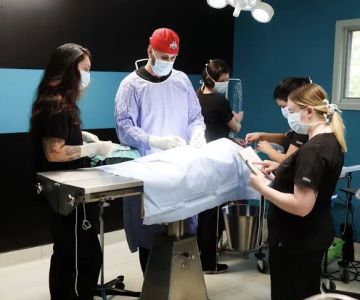Is Veterinary Assistant a Good Job? Benefits and Challenges Explained
- 1. Career Overview: What Does a Veterinary Assistant Do?
- 2. Skills Required for a Veterinary Assistant
- 3. The Benefits of Being a Veterinary Assistant
- 4. Challenges You Might Face as a Veterinary Assistant
- 5. Salary, Career Opportunities, and Job Outlook
- 6. How to Become a Veterinary Assistant
1. Career Overview: What Does a Veterinary Assistant Do?
As a veterinary assistant, you play a crucial role in helping animals and supporting veterinary staff. Veterinary assistants are often the backbone of a veterinary clinic, working closely with veterinarians and technicians to provide quality care to pets and animals. You will assist in various tasks, such as handling animals, administering medications, performing lab work, cleaning and sterilizing equipment, and assisting with surgeries. If you enjoy working with animals and providing hands-on care, this career could be a great fit for you.
2. Skills Required for a Veterinary Assistant
To be successful as a veterinary assistant, certain skills and qualities are essential. These include:
- Strong communication skills: You’ll need to communicate effectively with pet owners, veterinarians, and other staff members.
- Attention to detail: Being thorough in tasks like administering medication, recording patient information, and sterilizing equipment is critical.
- Physical stamina: Veterinary assistants often work long hours and may need to handle animals that are uncooperative or in distress.
- Empathy and compassion: Working in an environment with animals that need care or are experiencing pain requires empathy for both the animals and their owners.
- Problem-solving skills: Whether you’re assisting with a complicated procedure or handling an emergency, quick thinking and problem-solving are important.
3. The Benefits of Being a Veterinary Assistant
There are several perks to working as a veterinary assistant. Here are some key benefits:
- Job satisfaction: Helping animals and making a positive impact on their lives is one of the most rewarding aspects of the job.
- Steady demand: As the need for veterinary care continues to grow, so does the demand for skilled veterinary assistants. This provides job security in the long term.
- Variety of work: The job offers a mix of tasks that can keep you engaged and constantly learning. From hands-on animal care to administrative tasks, there is always something new to do.
- Opportunities for advancement: Many veterinary assistants choose to continue their education and move into higher roles, such as veterinary technicians or practice managers.
4. Challenges You Might Face as a Veterinary Assistant
While the role of a veterinary assistant is highly rewarding, it can come with its challenges. Some of the common difficulties include:
- Emotional strain: Dealing with sick or injured animals and the emotional stress that comes with pet loss can be tough on veterinary assistants.
- Physical demands: The job can be physically demanding, with long hours and the need to handle large or difficult animals.
- Low pay: While the job is fulfilling, veterinary assistants generally earn lower salaries compared to other healthcare professionals. However, many find the emotional rewards to outweigh the financial challenges.
5. Salary, Career Opportunities, and Job Outlook
The salary of a veterinary assistant varies depending on location, experience, and the type of practice. On average, a veterinary assistant can expect to earn around $30,000 per year, though this can range from $23,000 to $38,000 annually. There are also opportunities for growth in the field, especially if you pursue further education and certifications. The job outlook for veterinary assistants is positive, with a projected growth rate of 15% from 2019 to 2029, which is much faster than the average for other occupations.
6. How to Become a Veterinary Assistant
To become a veterinary assistant, you typically need to complete a postsecondary education program that offers the necessary training. Many community colleges and vocational schools offer programs that can take about one to two years to complete. During the program, you will learn about animal anatomy, physiology, medical terminology, and clinical skills. While certification is not always required, becoming certified can increase your job prospects and earning potential. You can also gain experience by working as an intern or volunteer at animal clinics.
Whether you're looking to make a meaningful difference in the lives of animals or considering a career in veterinary care, being a veterinary assistant offers great rewards. It provides the chance to work in a fulfilling environment with ample opportunities for advancement.











